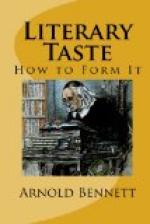What applies to history applies to the other “dry” branches. Even Johnson’s Dictionary is packed with emotion. Read the last paragraph of the preface to it: “In this work, when it shall be found that much is omitted, let it not be forgotten that much likewise is performed.... It may repress the triumph of malignant criticism to observe that if our language is not here fully displayed, I have only failed in an attempt which no human powers have hitherto completed....” And so on to the close: “I have protracted my work till most of those whom I wish to please have sunk into the grave, and success and miscarriage are empty sounds: I therefore dismiss it with frigid tranquillity, having little to fear or hope from censure or from praise.” Yes, tranquillity; but not frigid! The whole passage, one of the finest in English prose, is marked by the heat of emotion. You may discover the same quality in such books as Spencer’s First Principles. You may discover it everywhere in literature, from the cold fire of Pope’s irony to the blasting temperatures of Swinburne. Literature does not begin till emotion has begun.
There is even no essential, definable difference between those two great branches, prose and poetry. For prose may have rhythm. All that can be said is that verse will scan, while prose will not. The difference is purely formal. Very few poets have succeeded in being so poetical as Isaiah, Sir Thomas Browne, and Ruskin have been in prose. It can only be stated that, as a rule, writers have shown an instinctive tendency to choose verse for the expression of the very highest emotion. The supreme literature is in verse, but the finest achievements in prose approach so nearly to the finest achievements in verse that it is ill work deciding between them. In the sense in which poetry is best understood, all literature is poetry—or is, at any rate, poetical in quality. Macaulay’s ill-informed and unjust denunciations live because his genuine emotion made them into poetry, while his Lays of Ancient Rome are dead because they are not the expression of a genuine emotion. As the literary taste develops, this quality of emotion, restrained or loosed, will be more and more widely perceived at large in literature. It is the quality that must be looked for. It is the quality that unifies literature (and all the arts).




